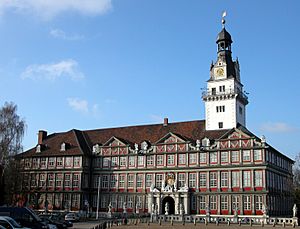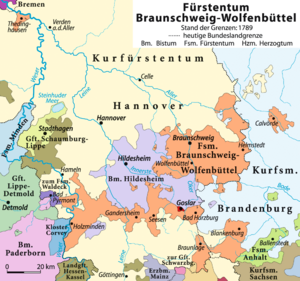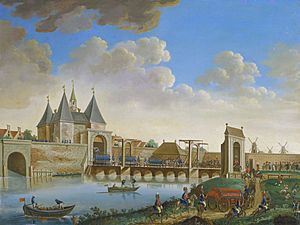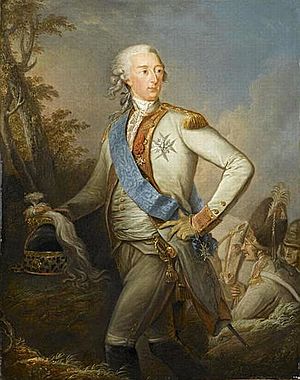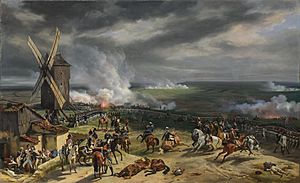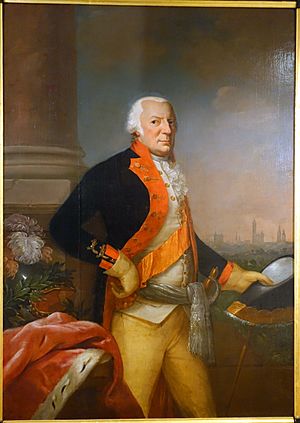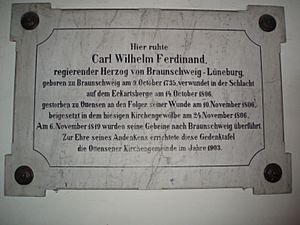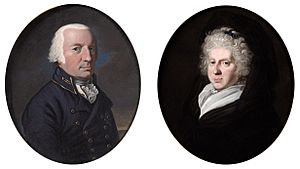Charles William Ferdinand, Duke of Brunswick facts for kids
Quick facts for kids Charles William Ferdinand |
|
|---|---|
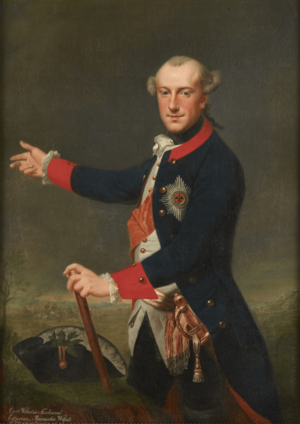
An 18th century portrait by Johann Georg Ziesenis
|
|
| Prince of Brunswick-Wolfenbüttel | |
| Reign | 26 March 1780 – 10 November 1806 |
| Predecessor | Charles I |
| Successor | Frederick William |
| Born | 9 October 1735 Wolfenbüttel, Brunswick-Wolfenbüttel, Holy Roman Empire |
| Died | 10 November 1806 (aged 71) Ottensen, Hamburg |
| Burial | 24 November 1806 Christianskirche, Ottensen, Hamburg 6 November 1819 Brunswick Cathedral |
| Spouse | |
| Issue Details |
|
| House | Brunswick-Bevern |
| Father | Charles I, Duke of Brunswick-Wolfenbüttel |
| Mother | Princess Philippine Charlotte of Prussia |
| Signature | |
Charles William Ferdinand (born October 9, 1735 – died November 10, 1806) was an important leader in 18th-century Europe. He was the prince of Brunswick-Wolfenbüttel and a duke of Brunswick-Lüneburg. In English, people usually called him the Duke of Brunswick.
He took over from his father as the ruler of Brunswick-Wolfenbüttel, which was a small state in the Holy Roman Empire. The Duke was known for being a wise and kind ruler, much like his famous uncle, Frederick the Great. He was married to Princess Augusta of Great Britain, who was the older sister of George III of Great Britain, the King of England.
Charles William Ferdinand was also a very skilled military leader. He became a Field Marshal in the Prussian Army. During the Napoleonic Wars, he was badly hurt in the Battle of Jena–Auerstedt in 1806 and later died from his injuries.
Contents
Early Life of Charles William Ferdinand
Charles William Ferdinand was born in Wolfenbüttel on October 9, 1735. He was probably born in Wolfenbüttel Castle. He was the first son of Charles I, Duke of Brunswick-Wolfenbüttel and his wife, Princess Philippine Charlotte of Prussia.
His father, Charles I, was the ruler of the small state of Brunswick-Wolfenbüttel. His mother, Philippine Charlotte, was the favorite daughter of King Frederick William I of Prussia. She was also the sister of Frederick II of Prussia, known as Frederick the Great. As the first son, Charles William Ferdinand was the heir apparent, meaning he would inherit the throne.
He received a very good and broad education, which his mother carefully supervised. When he was young, he traveled to the Netherlands, France, and different parts of Germany. In 1753, his father moved the capital of their state back to Brunswick. This was the largest city in the state. The royal family then moved into the newly built Brunswick Palace.
Becoming a Military Leader
Charles William Ferdinand joined the military and fought in the Seven Years' War (1756–1763). He joined the allied forces from northern Germany. Their job was to protect Hanover and nearby states from the French army.
At the Battle of Hastenbeck in 1757, Charles William Ferdinand bravely led an infantry charge. This action made him quite famous. After a temporary setback, his uncle, Ferdinand of Brunswick, took command of the allied forces. Charles William Ferdinand rejoined the army as a general.
He fought in important battles like the Battle of Minden (1759) and the Battle of Warburg (1760). In these battles, he proved to be an excellent commander. He continued to serve under his uncle for the rest of the war. His reputation grew, and he became known for his skill in unconventional warfare. The war ended in 1763.
Marriage and European Adventures
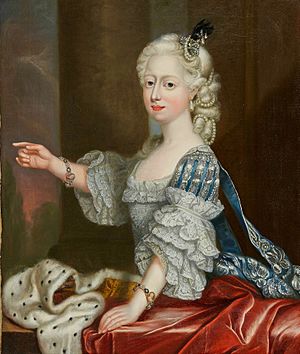
Royal families in the region often married within their own family. This was to keep their lands together. Charles William Ferdinand was arranged to marry Princess Augusta of Great Britain. She was the daughter of Frederick, Prince of Wales, and the sister of the reigning King George III.
In 1764, after the Seven Years' War, he traveled to London to marry Princess Augusta. The British people gave him a very warm welcome. They were grateful for his service alongside British troops during the war. The British Parliament even gave him a large sum of money as a wedding gift.
However, King George III was not as welcoming. He tried to show his disapproval in small ways. For example, he made the prince stay at Somerset House instead of a royal palace. But this only made the public like the prince even more. After only thirteen days, the prince returned home with his new wife.
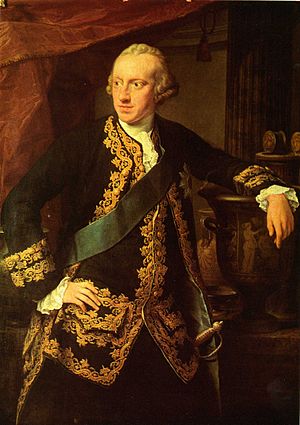
Over the next few years, the couple traveled widely across Europe. They visited many major countries. In 1766, they went to France, where they were welcomed with respect. They also visited Switzerland and met the famous writer Voltaire. Their longest stop was in Rome, where they explored ancient sites. After visiting Naples, they returned to Brunswick.
Ruling Brunswick-Wolfenbüttel
Fixing the State's Money Problems
Charles William Ferdinand's father, Charles I, had spent a lot of money on the war. This almost bankrupted the state. So, in 1773, Charles William Ferdinand was given a big role in fixing the economy. He worked with a special advisor named Féronce von Rotenkreuz. They were very successful. They improved the state's finances and economy. This made the prince very popular with the people.
When the American Revolutionary War started in 1775, Charles William Ferdinand saw a chance to earn money for his state. He rented out his well-trained army to Great Britain. In 1776, Brunswick-Wolfenbüttel sent 4,000 troops to America. These troops fought alongside the British. However, many of these soldiers were captured by the Americans. They were held captive until the war ended in 1783.
A Wise Ruler
Charles I died in 1780, and Charles William Ferdinand became the new ruler. He quickly became known as a model sovereign. He was an "enlightened despot," meaning he ruled with absolute power but used it to improve his people's lives. He was careful with money and very sensible.
The Duke cared about his people's well-being. He made gradual changes, finding a good balance between old traditions and new ideas. He supported arts and sciences, especially the young mathematician Carl Friedrich Gauss. The Duke paid for Gauss to go to university, even though Gauss's father did not want him to.
He was similar to his uncle, Frederick the Great, but he was more cautious. He made Brunswick a close ally of Prussia. He was a Prussian field marshal and made his own regiment a model for others.
The Duke was often involved in important diplomatic matters. In 1784, he secretly hosted Karl August, Duke of Saxe-Weimar. They discussed forming a league of German states. This league, called the Fürstenbund (League of Princes), was created in 1785. It successfully stopped the Austrian Empire from expanding.
A Swedish princess visited Brunswick in 1799. She described the Duke as "witty, literal and a pleasant acquaintance." She also said he was "quite strict, but a good father of the nation." In 1803, Brunswick gained control of two nearby religious areas, Gandersheim and Helmstedt.
A Skilled Military Commander
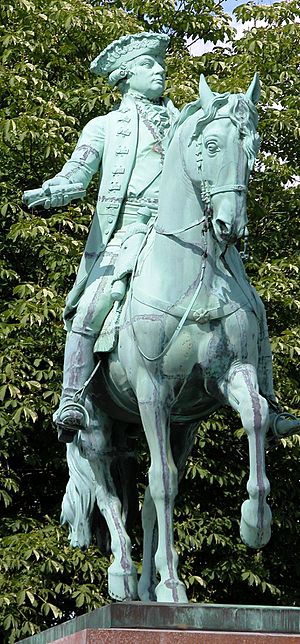
He became a Prussian general in 1773.
The War of Bavarian Succession
From 1778 to 1779, he fought in the War of the Bavarian Succession. Frederick II personally praised the prince for his actions during this war.
Taking Back the Netherlands
In 1787, the Duke became a Generalfeldmarschall (Field Marshal) in the Prussian army. Frederick William II of Prussia put him in charge of 20,000 Prussian soldiers. Their mission was to invade the United Provinces of the Netherlands (the Dutch Republic). The goal was to stop the "Patriots" who were rebelling. They wanted to bring back the power of the stadtholder William V.
The Duke's invasion was very fast and successful. It was almost bloodless. He outsmarted the Patriots, and their militias could not stop him. Many Patriots fled to France.
The Duke's forces entered the Netherlands on September 13. They quickly captured several cities. Amsterdam, the last city held by the Patriots, surrendered on October 10. The entire campaign took less than a month. William V was restored to power. People praised the Duke for his quick and decisive actions. He was also praised for the low number of casualties.
Facing the French Revolution
In 1792, the War of the First Coalition began. France declared war on Austria. The Holy Roman Emperor and the King of Prussia combined their armies and put them under Brunswick's command.
The Brunswick Proclamation
On July 25, 1792, the Duke issued the "Brunswick Proclamation" from Coblenz. This statement warned the French people that if they harmed Louis XVI and his family, or resisted the allied armies, they would face severe consequences. Much of this manifesto was written by Louis XVI's cousin, Louis Joseph de Bourbon, Prince de Condé.
Some say the Duke himself did not agree with the manifesto. He sympathized with the idea of a constitutional monarchy in France. As a soldier, he doubted the plan would work. However, since his name was on it, he had to take responsibility. The proclamation was meant to scare the French people into giving up. Instead, it had the opposite effect.
In Paris, many people already believed Louis XVI was working with the Austrians and Prussians. The manifesto made the republicans even angrier. It seemed to prove that the King was against his own people. When news spread that Brunswick's army was marching into France, the people of Paris became furious. On August 10, they stormed the Tuileries Palace, a royal residence.
Invading France
The Duke was disappointed that Britain stayed neutral. His first advance into France was slow. Bad weather, difficult terrain, and an illness among his troops caused delays.
The Duke was less successful against the French citizen army at Valmy. After taking Longwy and Verdun easily, he turned back after a small fight at Valmy. He then left France.
He had planned to spend the winter in Verdun and continue the fight in the spring. But French forces outflanked him. The Duke left Verdun on October 8 and Longwy on October 22, retreating back into Germany.
In 1793, he counterattacked the French who had invaded Germany. He recaptured Mainz after a long siege. But he resigned in 1794 because of interference from Frederick William II of Prussia.
The Final Battle: War of the Fourth Coalition
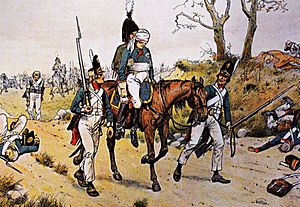
Prussia did not join the earlier wars against Revolutionary France. However, in 1806, Prussia declared war on France. This started the War of the Fourth Coalition. Even though he was over 70 years old, the Duke of Brunswick returned to command the Prussian army. He did so at the personal request of Queen Louise of Prussia.
By this time, the Prussian army was considered old-fashioned. Their tactics were outdated, and communication was poor. The army's leadership was especially criticized. Many officers had different plans and argued about which to follow. This led to disorganization and confusion.
The Duke commanded the large Prussian army at Auerstedt. This was part of the double Battle of Jena–Auerstedt on October 14, 1806. His forces were defeated by Napoleon's marshal Davout. This happened even though the Prussians outnumbered the French at Auerstedt. During the battle, a musket ball hit the Duke, and he lost both of his eyes. His second-in-command was also badly wounded. This caused the Prussian command to fall apart.
Severely wounded, the Duke was carried away as the French advanced. He died from his wounds in Ottensen on November 10, 1806.
The Duke's body was first buried in the Christianskirche at Ottensen in 1806. Later, on November 6, 1819, his body was moved and reburied in Brunswick Cathedral.
Family Life
On January 16, 1764, Charles married Princess Augusta of Great Britain. She was the older sister of King George III. They were second cousins, meaning they shared great-grandparents. Their families had often married each other over the years.
Some people have suggested that this close family marriage might have caused health challenges for some of their children. The Duke once described his children as having "challenges in mind and body."
Soon after they married, the prince built the Schloss Richmond for his wife. It was designed in an English style with an English landscape garden. This was to remind her of her home in England.
The Duke and his wife Augusta had four sons and three daughters. Three of their four sons faced significant health challenges. Their oldest son, Karl Georg August (1766–1806), was named the next in line to the throne. However, he had a significant learning disability. He married Frederika of Orange-Nassau in 1790. He died without children at age 40, shortly before his father.
Their second son, Georg Wilhelm Christian (1769–1811), had even more severe learning difficulties. He was declared unable to rule and was removed from the line of succession. He never married. The couple's third son was August (1770–1822). He was blind and also removed from the succession. He never married either.
The fourth son, Friedrich Wilhelm (1771 – June 16, 1815), was healthy. He eventually became Duke after his father. He married and had two sons.
Frederick and Augusta also had three daughters. Two of them lived to adulthood. The elder daughter, Auguste Caroline Friederike (1764–1788), married the future King Frederick I of Württemberg. She died in Russia.
The younger daughter, Caroline of Brunswick, married her first cousin, the future George IV of the United Kingdom, in 1795. She had one daughter with him. Caroline died shortly after she was prevented from attending her husband's coronation.
The Duke also had at least one child outside of marriage, a son named Forstenburg. He began a promising military career but was killed in action in 1793.
His Children
| Name | Birth | Death | Notes |
|---|---|---|---|
| Auguste Caroline Friederike Luise | December 3, 1764 | September 27, 1788 | married 1780, Friedrich III, Duke of Württemberg; had children |
| Karl Georg August | February 8, 1766 | September 20, 1806 | married 1790, Frederika Luise Wilhelmine, Princess of Orange-Nassau; no children |
| Caroline Amalie Elisabeth | May 17, 1768 | August 7, 1821 | married 1795, George IV of the United Kingdom; had children |
| Georg Wilhelm Christian | June 27, 1769 | September 16, 1811 | Had health challenges; removed from succession |
| August | August 18, 1770 | December 18, 1822 | Had health challenges; removed from succession |
| Friedrich Wilhelm | October 9, 1771 | June 16, 1815 | married 1802, Maria Elisabeth Wilhelmine, Princess of Baden; had children |
| Amelie Karoline Dorothea Luise | November 22, 1772 | April 2, 1773 |
Images for kids


